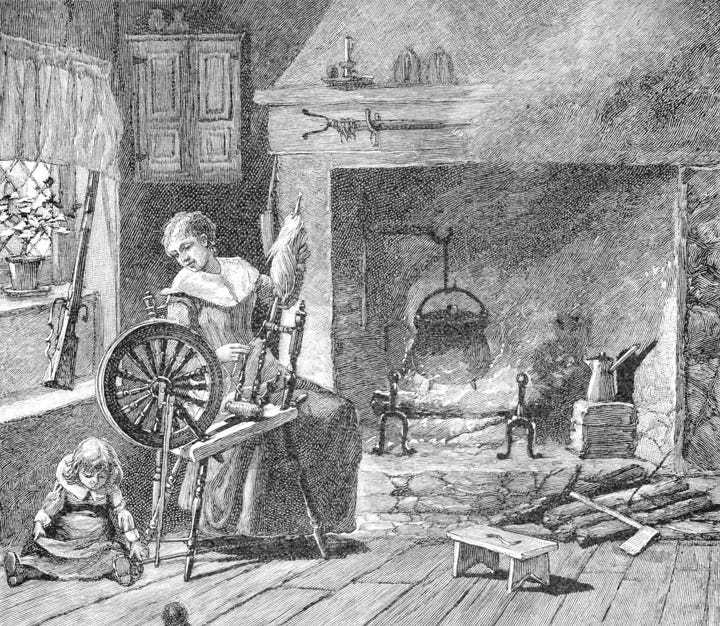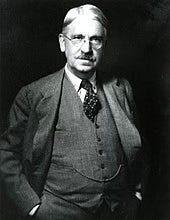“In our secular society, school has become the replacement for church, and like church it requires that its teachings must be taken on faith.” - John Taylor Gatto
Note: If you haven’t read part 1 of this series…head over there first! This will build on the information contained there.
Perhaps you’re asking yourself…Bridget, why take up this crusade? Public schools are here to stay. Plenty of us went through them and turned out just fine. Well, I suppose it’s because I don’t actually think we’re “just fine.” As of 2022, Pew Research reports that only 30% of adults report attending church services 1x per month. For a nation built on Christian values…that’s pretty abysmal.
A comparison here may be helpful. Again, from 2022 research, 83% of our nation’s children attended public schools. 30% 1x per month versus 83% 5x a week. Yikes.
John Dewey, who will be introduced to you today as one of the main forces behind our current school system, had a contemporary associate named Charles Potter. Both were humanists. Potter posed the question:
“What can theistic Sunday school, meeting for an hour once a week, and teaching only a fraction of the children, do to stem the tide of a five-day program of humanistic teachings?”
The answer, of course, is nothing. And so THIS is why I believe it deserves to be a part of the conversation. After a lot of research, my opinion is that our schooling system is the root of the spiritual downfall of our country. It has encouraged abdication of parental responsibility, a secular indoctrination of the majority of the population, and finally it has become a replacement for the community we used to find in our Churches, rendering them generally obsolete.
What did education look like before public schooling?
In order to contrast our current system, we must look at what the system used to be.
If you’ve followed the resurgence of home birth, it probably won’t surprise you that this is also where schooling began…at home. The majority of early Americans, including many presidents, were homeschooled. Beyond home learning, other options were available in a free market system of schools run by churches, entrepreneurs, and private tutors.
Enter Scene: Horace Mann
That rather unfriendly looking fellow down below was a politician who rejected Christianity in favor of big government.
He discovered the Prussian model of education that we discussed in part 1, and decided it was the perfect method for America’s children. In fact, he wrote that those who were a part of the “sacred cause of education” were “entitled to look upon all parents as having given hostages to our cause.”
While this may be a bit hyperbolic…hostages for a cause?? Yikes. As parents, then, it seems important to find out just what exactly that “cause” might be. Remove God, and restructure society to create a “heaven on earth” rather than focusing on our true end.
Anthony Esolen gave three reasons, in 2020, why parents need to take back education. I find them very interesting when juxtaposed with Mann’s intentions.
To protect and promote the family and therefore the nation whose health rests upon the health of the family;
To form the natural imaginations of our children, understanding that ideas of good and evil remain merely notional and inert without the power of passions ordered by right reason;
To direct their souls and ours, individually and in community, toward their source and end in Christ.
The fact that we need to “take back” education in order to rightly order our children towards God/the eternal tells me that Mann would consider our modern day results from his system quite successful.
The Education Reform Evangelist
After founding the very first Board of Education, and serving as its president, Mann traveled to Prussia to see his favorite system in action. When he came back to the states, he traveled the country attempting to convert the very conservative Christian culture to the “common school” method.
While he got the ball rolling, a man named John Dewey, born the year that Horace Mann died, would manage to implement country-wide what Mann had started.
Enter Scene: John Dewey
A prolific writer, we again do not have to guess at Dewey’s belief system and aims. Another man who rejected Christianity, and believed that education should bring about a “new social order.” A socialist at best, and a communist at worst, he would speak fondly of the Soviet Union. He was particularly fond of their education system, which produced a “collectivistic mentality” in their children.
In the 1898 essay “The Primary Education Fetich,” Dewey argued emphatically against the emphasis on reading, writing and arithmetic. Instead, he pushed for young students to focus on socialization, with an emphasis on collectivism.
Raise your hand if you’re a homeschooler who has been asked how in the world you’ll ever socialize?! Cue flashbacks to my childhood ;)







